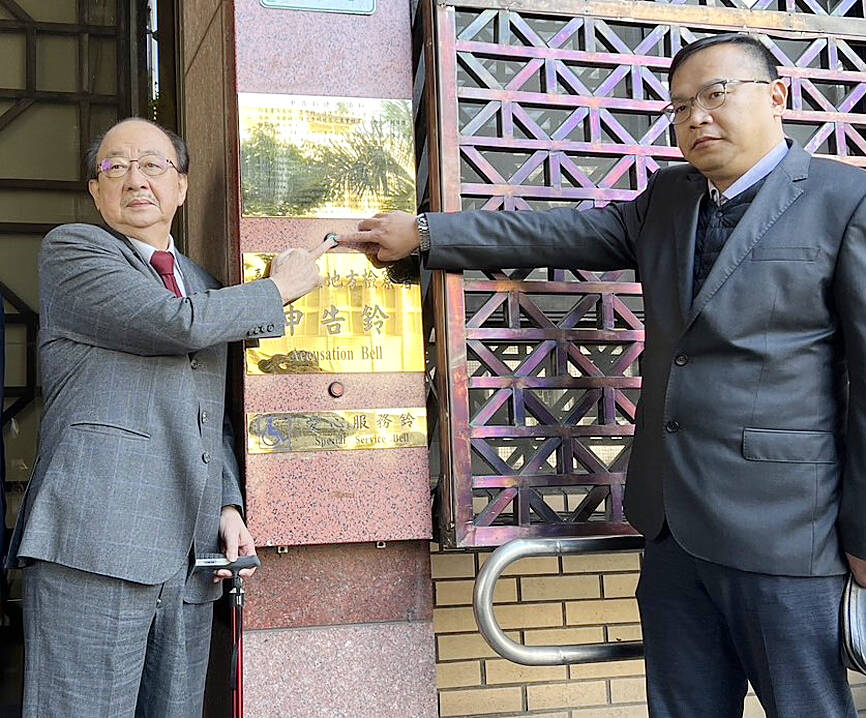A bill to tighten scrutiny on TikTok has been proposed by Democratic Progressive Party (DPP) Legislator Lin Tai-hua (林岱樺) after an altered video of party caucus whip Ker Chien-ming (柯建銘) was spread via the platform.
The video was edited footage of Ker speaking at a news conference, where the audio and subtitles were changed to him saying: “Here is Ker Chien-ming telling you, Taiwan will be left in the darkness if it remains in the hands of the DPP.”
The subtitles were in simplified Chinese, just as in a deepfake video of DPP Legislator Wang Yi-chuan (王義川).

Photo: Reuters
Ker last night issued a statement saying that the video is fake.
He and Wang yesterday filed a complaint with the Criminal Investigation Bureau and the Taipei District Prosecutors’ Office, accusing disseminators on TikTok of defamation and privacy offenses, and the dissemination of false images.
Investigators accepted Ker’s case and said they would look into the origins of the video, National Police Agency Director-General Chang Jung-hsin (張榮興) said.

Photo: Chen Tsai-ling, Taipei Times
At a meeting of the legislature’s Internal Administration Committee yesterday, Minister of the Interior Liu Shyh-fang (劉世芳) said police suspect the video could have originated abroad.
The proposed draft amendments to the Anti-Infiltration Act (反滲透法) stipulate that digital platforms such as TikTok either be supervised in accordance with local regulations or be banned from the local market.
Lin said the proposal has garnered support from multiple legislators and would soon be submitted to the legislature’s committees for review.
“We would demand that TikTok leave Taiwan if it continues to support scams and ‘united front’ activities,” Lin said, adding that the bill was formulated to safeguard democracy and national security in line with the latest regulatory development in Western countries.
According to the bill, TikTok has caused concerns over infringements of national security, personal privacy and democratic politics due to its questionable algorithm and operational mechanism.
If a digital platform such as TikTok has been judged to have such problems, it should abide by the government’s instructions to set up an operating entity and database within the territory of the Republic of China, and come under local jurisdiction and supervision by the cybersecurity management systems, it says.
Lin said China’s cognitive warfare continues to develop, to the extent that disinformation in the form of deepfakes is published on TikTok and other social media platforms, with influencers and public relations companies commissioned to disseminate it.
She also cited the US Court of Appeals as saying that tightened control over TikTok is no more than a countermeasure against external interference and does not contradict the freedom of speech protected by the US Constitution, as China poses a national security threat.
DPP Legislator Puma Shen (沈伯洋) yesterday said that fake videos of politicians and political commentators have become rampant, although most of them were roughly made and can be easily seen through.
“I have been a victim of deepfakes, too,” he said.
Although refined deepfake videos have yet to be launched, they could be released at critical moments, Shen said, calling on the public not to forward such videos.
People should promptly report fake videos to the authorities and, more importantly, refrain from pointing out its errors in case the creators of fake videos use the advice to improve their technology and make it harder to detect fakes next time, he added.
Additional reporting by CNA

NEW AGREEMENT: Malaysia approved imports last year after nearly two years of negotiations and inspections to meet quarantine requirements, officials said Up to 3.6 tonnes of pomeloes from Taiwan cleared Malaysian customs on Friday, in the first shipment of Taiwanese pomeloes to Malaysia. Taiwan-grown pomeloes are popular in domestic and overseas markets for their tender and juicy taste, the Ministry of Agriculture’s Animal and Plant Health Inspection Agency said. The fruit is already exported to Japan, Canada, Hong Kong, Singapore and the Philippines, it added. The agency began applying for access to the Malaysian market in 2023, compiling data on climate suitability, pests and diseases, and post-harvest handling, while also engaging in nearly two years of negotiations with Malaysian authorities and submitting supplementary

PEAK MONTHS: Data showed that on average 25 to 27 typhoons formed in the Pacific and South China seas annually, with about four forming per month in July and October One of three tropical depressions in the Pacific strengthened into a typhoon yesterday afternoon, while two others are expected to become typhoons by today, Central Weather Administration (CWA) forecaster Lee Ming-hsiang (李名翔) said yesterday. The outer circulation of Tropical Depression No. 20, now Typhoon Mitag, has brought light rain to Hualien, Taitung and areas in the south, Lee said, adding that as of 2pm yesterday, Mitag was moving west-northwest at 16kph, but is not expected to directly affect Taiwan. It was possible that Tropical Depression No. 21 would become a typhoon as soon as last night, he said. It was moving in a

One of two tropical depressions that formed offshore this morning could turn into a moderate typhoon by the weekend, the Central Weather Administration (CWA) said today. Tropical Depression No. 21 formed at 8am about 1,850km off the southeast coast, CWA forecaster Lee Meng-hsuan (李孟軒) said. It is expected to move in a northwesterly direction as it continues building momentum, possibly intensifying into Typhoon Mitag this weekend, she added. The radius of the storm is expected to reach almost 200km, she said. It is expected to approach southeast of Taiwan on Monday and pass through the Bashi Channel between Tuesday and Wednesday,

About nine Taiwanese are “disappeared,” detained, or otherwise deprived of freedom of movement in China each month, the Mainland Affairs Council (MAC) said yesterday. Between Jan. 1 last year and Aug. 31 this year, 188 Taiwanese travelers went missing, were detained and interrogated, or had their personal freedom restricted, with some questioned in airports or hotel lobbies, the council said. In a statement ahead of the Mid-Autumn Festival, the council urged people visiting China for any reason to be highly vigilant and aware of the risks. Of the reported cases, 50 people were “disappeared” after entering China, 19 were detained and 119 had